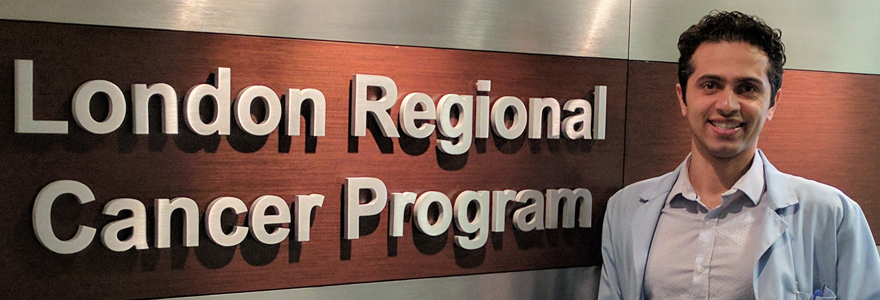Thinking like an entrepreneur to solve the cancer puzzle

Should academic science labs operate like start-up companies? Cancer researcher Saman Maleki, PhD’14, believes they should.
Maleki wants his ideas to mean something to cancer patients. It’s why he identifies as an entrepreneur scientist – someone he describes as a “rare breed of scientist” who brings the ‘move fast and break things’ mentality of Silicon Valley to the research environment.
“As a PhD student, I realized that I needed an entrepreneurial mindset to be an effective scientist,” he said. “I believe entrepreneur scientists will become a major driving force in the future, bringing solutions to real-life problems.”
This entrepreneurial thinking led Maleki to found Zealous Scientifics Inc., which currently provides consultant services for biotechnology companies looking to move drug discoveries to clinical trial.
“Founding a company exposed me to a whole new world outside academia,” he said. “I learned to see research from an investor’s perspective, to appreciate what it takes to move from hypothesis to investment to clinical testing and commercial viability.”
As an adjunct researcher professor with the Department of Oncology, Maleki is focused on cancer immunology, an emerging field that explores the role of the immune system in cancer progression and treatment.
One research project he is involved with recently received major funding from the Canadian Institutes of Health Research (CIHR) to explore novel ways of inducing neoantigen formation on tumour cells. The goal is to prompt an anti-tumour response by making cancers detectable to the immune system.
Another project combines fecal microbial transplants and immunotherapy to improve treatment outcomes for patients with melanoma. “We are trying to modify the patient’s microbiome so they will respond better to treatment,” Maleki explained. “There is ample evidence that the microbiome plays a role in cancer patients' response to immunotherapy.”
Translational science and collaboration factor significantly in Maleki’s work, as he aims to combine scientific knowledge with entrepreneurism and, ultimately, make a clinical impact.
“Translational science is a buzzword right now, but it’s important for me because there is a need to bridge the gap between clinical problems and basic science,” he said. “And one person cannot know and do everything, so I have to work closely with my clinical colleagues to understand the problems they are facing in the clinic.”
Born and raised in Tehran, Iran, Maleki completed an undergraduate degree in microbiology, followed by a master’s degree jointly between the University of Isfahan and the University of Freiburg in Germany. He arrived at Western University in 2008, completing his doctoral degree with Mansour Haeryfar, PhD, and James Koropatnick, PhD. Maleki then completed his postdoctoral studies with Koropatnick, studying several novel oncology drugs in collaboration with three biotechnology companies.
Maleki is one of only 29 young investigators – and one of only two Canadians – selected as part of the Society for Immunotherapy of Cancer Sparkathon program, which works to solve major hurdles facing the field of cancer immunotheraphy.
Having trained internationally, he draws inspiration from many people and places, but his mentor on the entrepreneurship front isn’t an Elon Musk or a Bill Gates; it is his mother.
“The first entrepreneur I really admired was my mother,” Maleki explained. “As a successful female business owner in Iran, she instilled that mindset in me early on – to focus on the solutions, not the problems.”


